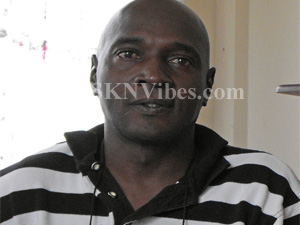|
|
|
Thousands in Federation denied equal rights…says SNAPD

|
|
|
|
|
|
|
| Anthony Mills, President of SNAPD, is hoping to improve public awareness in 2009. |
|
|
|
BASSETERRE, St. Kitts - ANTHONY MILLS, President of the St. Kitts-Nevis Association for Persons living with Disabilities (SNAPD), has firmly stated that it is time for wider society to recognise the equal rights of the estimated 4 500 persons living with disabilities in the Federation.
Throughout the history of St. Kitts-Nevis, persons living with disabilities have been marginalised and did not get the opportunity to better themselves within society, Mills informed SKNVibes in a recent interview.
According to the United Nations Convention on the Rights of Persons with Disabilities, “around 10 percent of the world’s population, or 650 million people, live with a disability”. Furthermore, the Convention states that 80 percent of persons with disabilities live in developing nations and “they are the world’s largest minority”.
“According to the statistics of the United Nations, at least 10 percent of every nation’s population is living with some kind of disability. So, if you look at St. Kitts-Nevis’ population and try to break it down, that would be about 4 500 people are living with disabilities.
“My question is how does society get to leave that amount of people out of the plans? That’s about two villages worth of people being ignored,” Mills said.
Persons living with disabilities in the Federation face daily challenges to living their lives, such as having equal access to buildings, obtaining gainful employment and receiving equal education opportunities.
“You can go where you want to go, but I can’t go where I want to go,” said the wheelchair-bound Mills. “I get to sit on the sidewalk and hand my money to somebody inside the store and wait for them to come out when they feel like. I have to sit outside and watch two or three people go in and come back out while I’m still waiting. If I had been able to go in there I would have been served before them, but I have to just wait.”
Mills said that SNAPD continues to aggressively educate the public on the rights of persons with disabilities by speaking at schools, meeting with government officials and campaigning in the media, but much work remains for the association to do in 2009.
“This year we are following up on some of the things we were trying to get accomplished last year, such as accessibility to public buildings and definitely getting St. Kitts-Nevis to sign on to the UN Convention.”
Because St. Kitts-Nevis has chosen not to ratify or sign the UN Convention on the Rights of Persons with Disabilities, Mills said the general public must put pressure on politicians to do so in the near future.
“We think that if we can get enough into the media, and get people to start paying attention, some of the people would then begin to go and look at the convention. Once people see that, they will start to realise it is a good thing…because I am of the firm view that everyone knows someone who either has a disability or has a relative who has a disability.
“Why the Convention is so important to us is because if we can get the government to sign and ratify it,…it pretty much becomes a part of the law of the land,” Mills said.
With the months of April and May packed with SNAPD events such as workshops, general public socials and a special one-hour programme on ZIZ, Mills said he expects the level of public awareness to rise dramatically in 2009.
“What I’m saying is let’s work together so I can be responsible for me. I’m not asking for much, just equal treatment,” the President said.
|
|
|
|
|
|
|
|